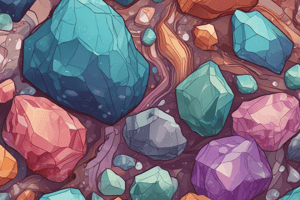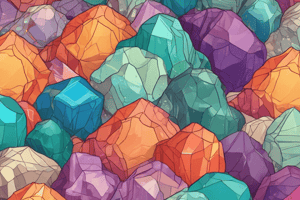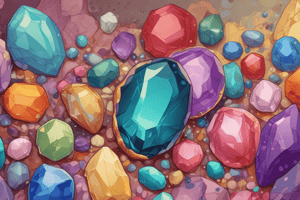Podcast
Questions and Answers
What is the standard against which all other color-change gems are judged?
What is the standard against which all other color-change gems are judged?
- Iolite
- Andalusite
- Tanzanite
- Alexandrite chrysoberyl (correct)
What causes the color change in alexandrite?
What causes the color change in alexandrite?
- Traces of chromium (correct)
- Phenomenal optical effects
- Pleochroism
- Heat treatment
What is the typical color of fine alexandrite in daylight or fluorescent light?
What is the typical color of fine alexandrite in daylight or fluorescent light?
- Green to bluish green (correct)
- Strongly saturated pure blue
- Red to purplish red
- Violetish blue
Why is tanzanite almost always heat-treated?
Why is tanzanite almost always heat-treated?
What is the only commercial source of gem-quality tanzanite?
What is the only commercial source of gem-quality tanzanite?
What is the impact of changes in tanzanite supply on availability and prices?
What is the impact of changes in tanzanite supply on availability and prices?
When is commercial-quality blue sapphire more marketable than commercial-quality tanzanite?
When is commercial-quality blue sapphire more marketable than commercial-quality tanzanite?
What is the current status of fine alexandrite in the gem marketplace?
What is the current status of fine alexandrite in the gem marketplace?
What is the impact of a large deposit of alexandrite discovered in Brazil in the early 1980s?
What is the impact of a large deposit of alexandrite discovered in Brazil in the early 1980s?
What is the ideal orientation for displaying the optical effects of pleochroic and phenomenal gems?
What is the ideal orientation for displaying the optical effects of pleochroic and phenomenal gems?
Due to its strong pleochroism, what is the main challenge in cutting tanzanite?
Due to its strong pleochroism, what is the main challenge in cutting tanzanite?
Why is Tanzanian tanzanite unique?
Why is Tanzanian tanzanite unique?
What is the reason behind the scarcity of fine alexandrite?
What is the reason behind the scarcity of fine alexandrite?
What is the impact of Russian alexandrite mines producing little today?
What is the impact of Russian alexandrite mines producing little today?
Why is heat-treatment necessary for tanzanite?
Why is heat-treatment necessary for tanzanite?
What is the characteristic of excellent alexandrite?
What is the characteristic of excellent alexandrite?
Tanzanites success in the marketplace was due to the promotions of what company?
Tanzanites success in the marketplace was due to the promotions of what company?
What is the most convincing tanzanite imitation to date?
What is the most convincing tanzanite imitation to date?
What are considered to be the most valuable Iolite ?
What are considered to be the most valuable Iolite ?
What is considered a more affordable alternative to tanzanite, selling at 1/10th of the price?
What is considered a more affordable alternative to tanzanite, selling at 1/10th of the price?
What makes Cat-Eye Chrysoberyl the most prized chatoyant gem ?
What makes Cat-Eye Chrysoberyl the most prized chatoyant gem ?
What stone's pleochroism is so strong that its hues are often visible simultaneously through the gem crown creating a mosaic effect?
What stone's pleochroism is so strong that its hues are often visible simultaneously through the gem crown creating a mosaic effect?
Due to its subtly color,hardness and durability, what stone is often placed in men's jewelry?
Due to its subtly color,hardness and durability, what stone is often placed in men's jewelry?
Flashcards are hidden until you start studying
Study Notes
Pleochroic and Phenomenal Gems
- Pleochroic and phenomenal gems require precise orientation to display their optical effects properly.
Alexandrite
- Alexandrite is the finest color-change gem, setting the standard for all other color-change gems.
- Green to bluish green in daylight or fluorescent light and red to purplish red in incandescent light.
- Fine alexandrite has a medium to medium-dark tone and moderately strong saturation.
- Russian alexandrite mines produce little today, but the rare and vivid hues of Russian alexandrite set the standard for fine color.
- A large deposit of alexandrite was discovered in Brazil in the early 1980s, briefly increasing alexandrite's availability.
- Currently, fine alexandrite is scarce and has virtually disappeared from the gem marketplace, except as an expensive collector's gem.
Tanzanite
- Tanzanite's success in the marketplace was due to enthusiastic promotion.
- The best tanzanite color is a strongly saturated pure blue or violetish blue with medium to medium-dark tone and moderately strong saturation.
- Due to tanzanite's strong pleochroism, cutters must balance weight retention against quality of face-up color.
- Tanzanite is almost always heat-treated to bring out its more attractive blue and violet hues.
- Tanzania is the only commercial source of gem-quality tanzanite.
- Changes in supply drastically affect availability and prices due to tanzanite coming from a single source.
- When moderately priced commercial-quality blue sapphire is available, it's more marketable than commercial-quality tanzanite.
Pleochroic and Phenomenal Gems
- Pleochroic and phenomenal gems require precise orientation to display their optical effects properly.
Alexandrite
- Alexandrite is the finest color-change gem, setting the standard for all other color-change gems.
- Green to bluish green in daylight or fluorescent light and red to purplish red in incandescent light.
- Fine alexandrite has a medium to medium-dark tone and moderately strong saturation.
- Russian alexandrite mines produce little today, but the rare and vivid hues of Russian alexandrite set the standard for fine color.
- A large deposit of alexandrite was discovered in Brazil in the early 1980s, briefly increasing alexandrite's availability.
- Currently, fine alexandrite is scarce and has virtually disappeared from the gem marketplace, except as an expensive collector's gem.
Tanzanite
- Tanzanite's success in the marketplace was due to enthusiastic promotion.
- The best tanzanite color is a strongly saturated pure blue or violetish blue with medium to medium-dark tone and moderately strong saturation.
- Due to tanzanite's strong pleochroism, cutters must balance weight retention against quality of face-up color.
- Tanzanite is almost always heat-treated to bring out its more attractive blue and violet hues.
- Tanzania is the only commercial source of gem-quality tanzanite.
- Changes in supply drastically affect availability and prices due to tanzanite coming from a single source.
- When moderately priced commercial-quality blue sapphire is available, it's more marketable than commercial-quality tanzanite.
Studying That Suits You
Use AI to generate personalized quizzes and flashcards to suit your learning preferences.




